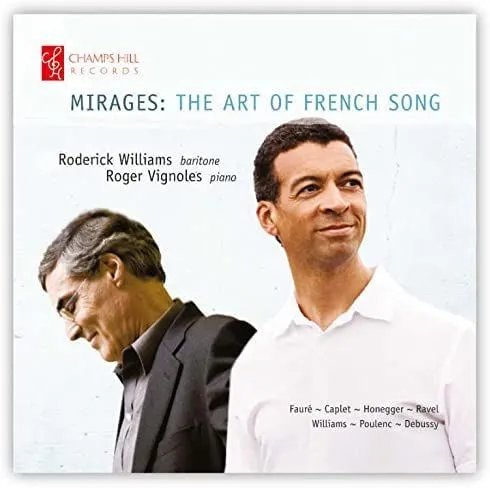
Mirages – The Art of French Song Debussy: Beau Soir; Caplet: Cinq Ballades françaises; Fauré: Mirages, Op. 113; Honegger: Petit Cours de Morale; Saluste du Bartas; Poulenc: Deux poèmes de Guillaume Apollinaire; Parisiana; Ravel: Don Quichotte à Dulcinée; Roderick Williams: Les ténèbres de l’amour Roderick Williams (baritone), Roger Vignoles (piano) Champs Hill CHRCD159 73:06 mins
Roderick Williams’s voice, with its smooth production and clear, unforced high notes, is well suited to the French mélodie, while his pronunciation is excellent. The Poulenc and Honegger songs are particularly successful, aided by Roger Vignoles’s alert accompaniments, and it’s good to hear Honegger in his more unbuttoned, tonal moods – I feel with other works there was often a little demon sitting on his shoulder muttering, ‘For Heaven’s sake, we’re in the 20th century now, do get with it!’ In Ravel’s three Don Quichotte songs my only reservation is over Vignoles’s generous pedalling in the third one: in the orchestral score, written under Ravel’s supervision, the pizzicato bass notes strongly imply a mainly unpedalled texture.
Fauré’s Mirages, which open the recital, pose problems even for native French singers in their conjunct, almost parlando vocal lines at a uniform tempo – any interval larger than a fourth is a notable event. They really need a greater variety of articulation and vocal colour than Williams supplies to avoid becoming a featureless drift. As for his own Verlaine settings, largely atonal, they may possibly be thought not entirely congruent with the disc’s subtitle, ‘The Art of French Song’. I merely raise the question as to whether this necessarily implies songs by French composers? But I do also venture to quote Poulenc’s sharp retort when Ned Rorem showed him his settings of Ronsard: ‘Stick to Americans and leave the French to us.’
Roger Nichols
More reviews
Prokofiev: Symphony No. 4; The Prodigal Son
Prokofiev: Complete Works for Violin
Prokofiev: Piano Concerto No. 3; Bartók: Piano Concerto No. 2